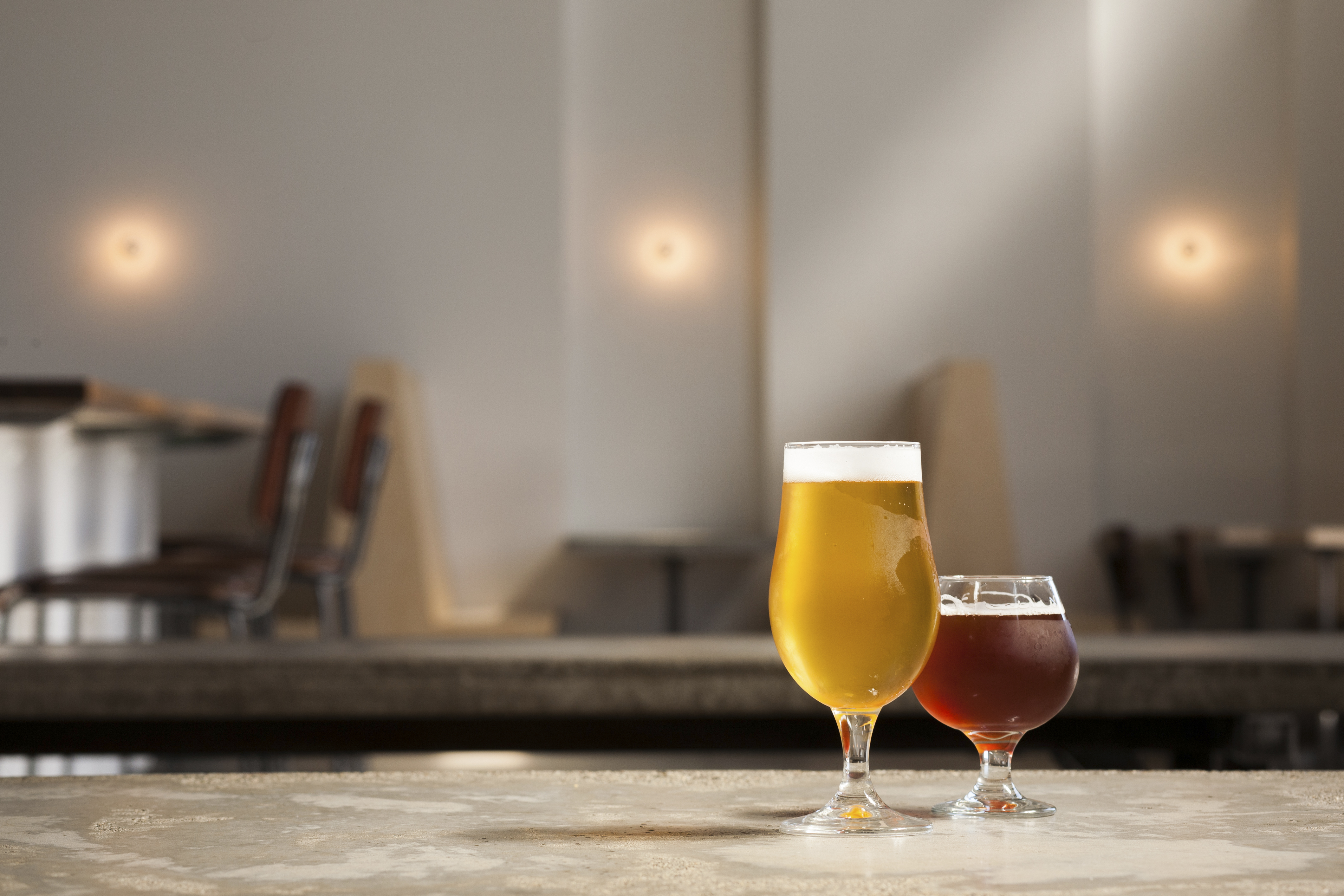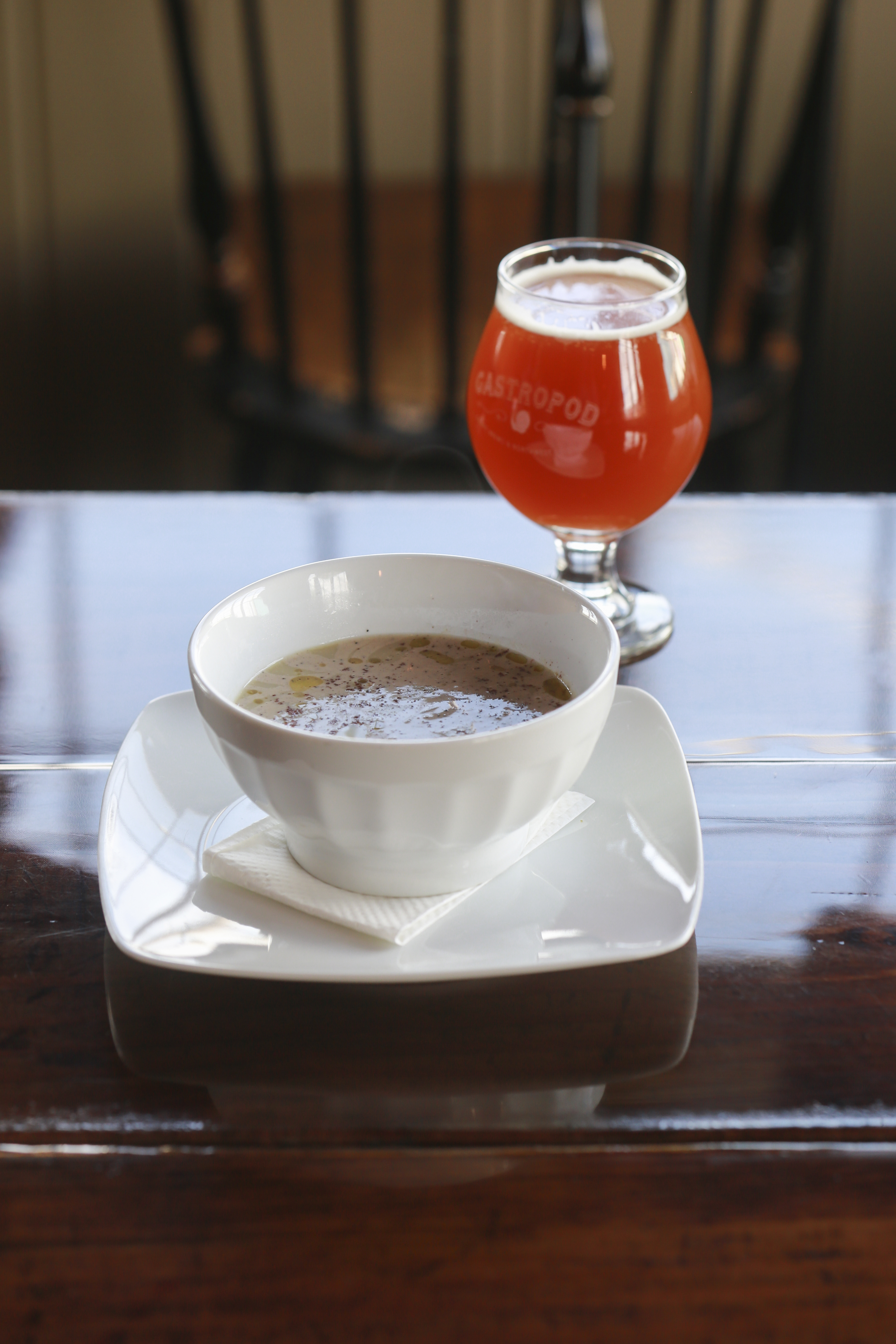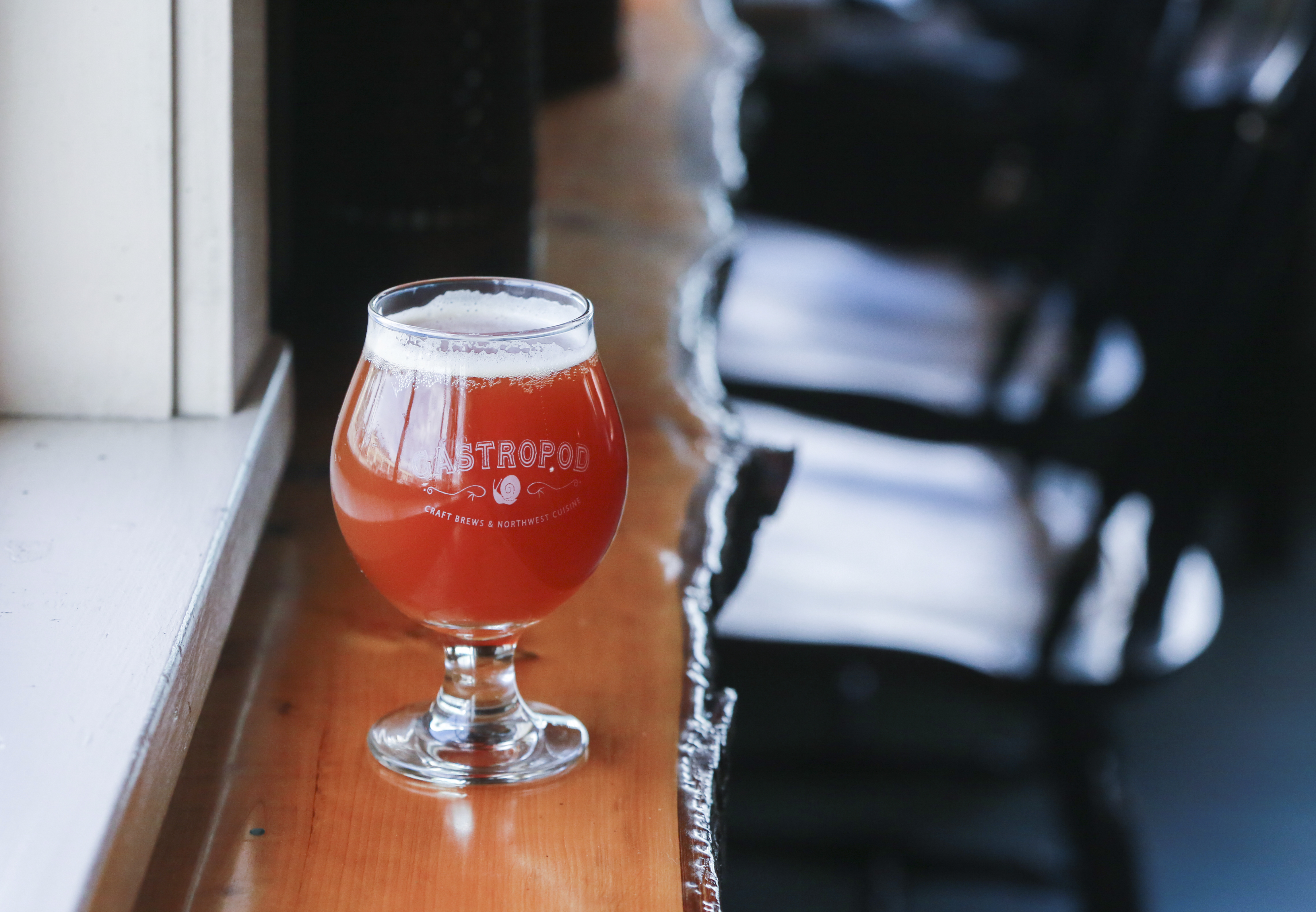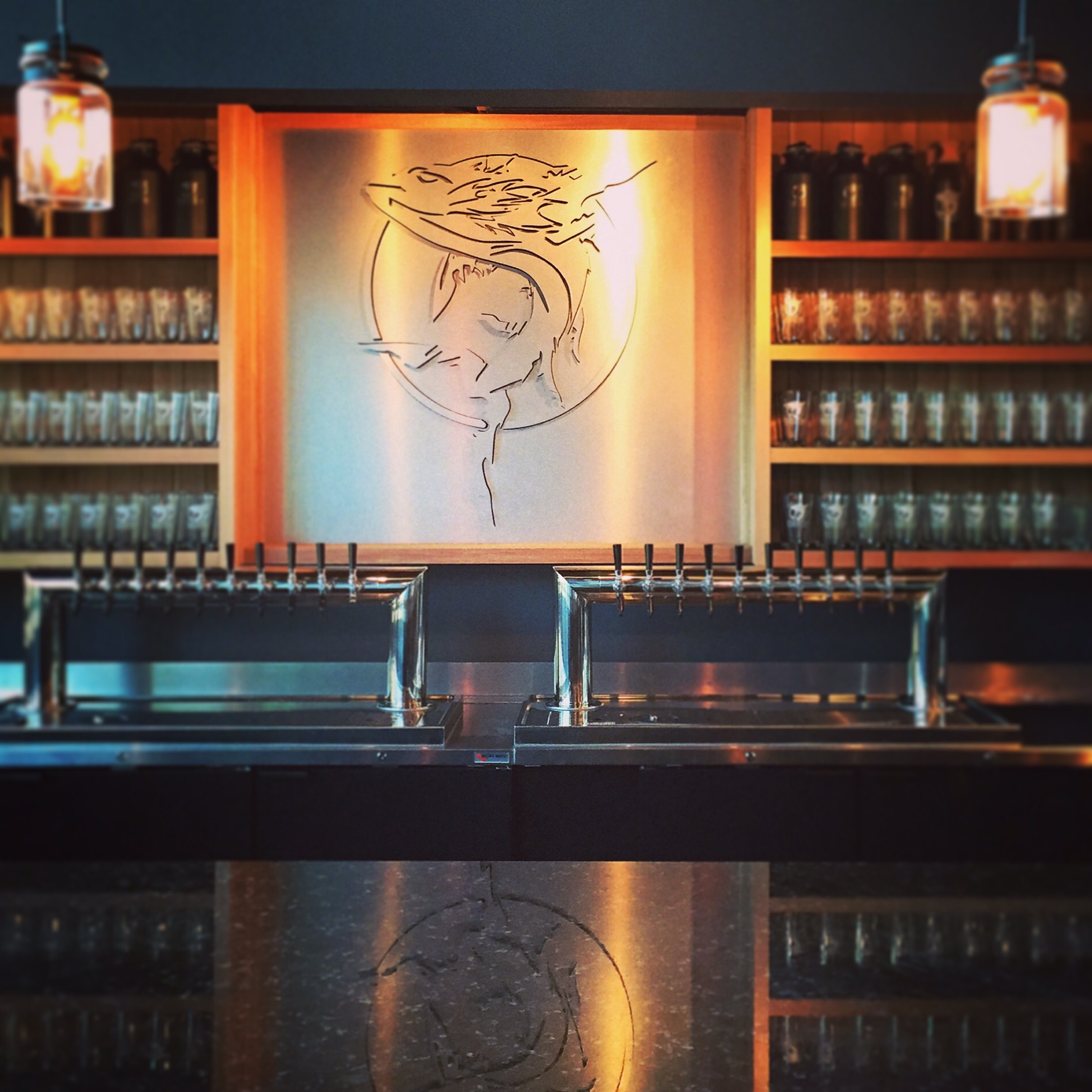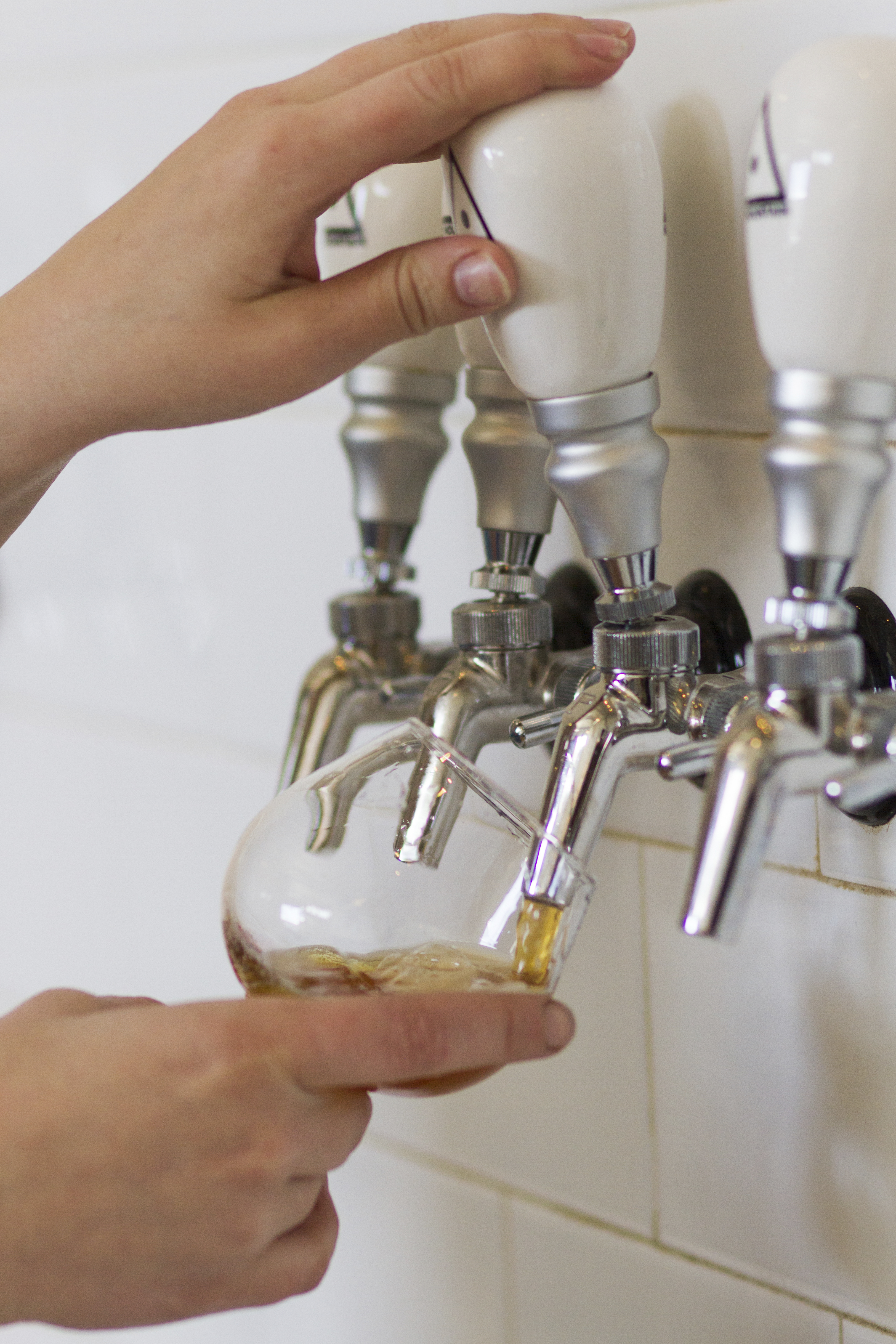THE TRAILBLAZER
Holy Mountain takes the lead with its unconventional styles—bringing them into the mainstream.
Adam Paysse wriggles loose the stopper in an oak barrel. He shines a flashlight into its depths, revealing a primordial goop of opaque white bubbles emerging from a pond-scum-like film. Underneath, apparently, is beer, which will one day be consumed by the eager masses lining up inside Holy Mountain Brewing’s taproom to sip Paysse’s latest experiments.
As Paysse, Holy Mountain’s president, explains, that “white, gnarly looking thing” is called a pellicle, a layer that forms over beer that ages on Brettanomyces, a type of yeast used in beer styles like saisons and lambics. Brewers endearingly call it “Brett,” as if it were a good buddy.
“What happens is—this is kind of rad—Brett will form this protein layer on top of the liquid it’s in,” says Paysse with noticeable excitement in his voice, in an effort to control the rate at which oxygen enters. “And here’s the really cool part: The pellicle will string together like a little bucket brigade, and when it wants more oxygen, the Brett cells at the top will pass down oxygen to other Brett cells until they put it in the solution,” he continues. “And you see all these crazy bubbles form because that’s CO$ID/aalt32 that’s trapped in the pellicle. It’s super-gross. We usually try not to show this to people.”
Such seemingly bizarre science experiments are commonplace at Holy Mountain, which opened in January in Interbay. It’s here where Paysse and his partners Colin Lenfesty and Mike Murphy dispense with the common notion of “flagship” beers.
Most breweries in Seattle consistently stock a predictable lineup, including an IPA, a pale ale, a blonde, and a stout. “For lack of a better term I always call that the ‘American brewpub model,’ ” Paysse says. “It’s like hamburger, French fries, milkshakes. You expect that.”
But you won’t find those standard offerings at Holy Mountain. Instead, the brewery’s menu rotates constantly, with a heavy dose of barrel-aged beers, farmhouse-style ales, and yeast-forward creations, like sour beers. Holy Mountain concentrates on the types of brews usually surfacing as limited releases at more traditional breweries.
As such, they’re helping write the newest chapter in the city’s maturing beer scene. Seattle’s proliferation of breweries shows no sign of slowing, but increasingly they’re departing from the predictable model and going for something more unique, mature, and creative. And they’re speaking to an increasingly broader, more educated audience.
No longer are the types of beers brewed at Holy Mountain and other edgy Seattle breweries the exclusive realm of “beer nerds,” a small subsection that is incredibly knowledgeable about various styles and well-versed in everything beer. The sours and saisons and barrel-aged beers are becoming mainstream.
If Holy Mountain had tried to open a decade ago—or perhaps sooner—it’s doubtful they would have been able to fill their current 60-seat taproom as consistently as they do today. Without the standard flagship pale/blonde/stout model, they may have been relegated to a smaller space, the sort of nanobrewery that would fly under the radar for all but the most dialed-in beer nerds.
But they’ve found incredible success right off the bat, testifying to Seattle’s maturing palate. They’ve added more employees and expanded their taproom hours, and say their beer has been “very well received.”
It appears Seattle was waiting for a place like Holy Mountain to open. “It was surprising to all of us, when we started talking about opening a brewery four or five years ago, we were like, ‘Why isn’t anyone doing this in Seattle?’ We didn’t understand it,” Paysse says. “It was a huge void.”
Paysse sees evidence in popular beer events like Brouwer’s annual Sour Beer Fest, part of Seattle Beer Week, which is consistently packed. “Sour beers are definitely achieving much more mainstreaming now. People realize that they’re awesome. But there are more and more people willing to try things that aren’t as commonplace.”
It helps Holy Mountain’s cause that beers like sours are attractive to a non-beer-drinking audience. Paysse says the brewery’s gose, a tart wheat beer that is barrel-fermented with coriander, was ordered by “all sorts of people who had that ‘I don’t really like beer but this is amazing’ reaction to that beer. That kind of stuff is rad. The spectrum of types of beers and flavors is impossibly broad.”
But Paysse emphasizes that while Holy Mountain is bucking tradition in the context of Seattle, they’re actually brewing some pretty traditional beers.
“We use a lot of old-school brewing traditions common in Belgium, Germany, and England, with very yeast-forward beers,” he says. “Most American breweries don’t highlight the yeast; it’s just there to ferment the beer. American beers, by and large, are very yeast-neutral. They sit back and allow the malt and the hops to shine, which is awesome, and you can make some phenomenal beers like that, but it’s a different balance. Our beer is pretty out-there for Seattle and pretty progressive, but it’s not that weird in a wider context.”
Paysse also says that Holy Mountain is still just getting started; they’re ramping up production of farmhouse ales, and have a growing number of beers aging in barrels for later release. “We’re about to start really testing the waters with some of those styles,” he says. “We’ll see what the market is.” THE OUTLIER
Ghostfish’s (delicious, seriously) gluten-free brews.
In another sign of Seattle’s maturing beer scene, the state’s first and only dedicated gluten-free brewery opened in SoDo in February. Ghostfish Brewing works with a 15-barrel brewing system; like Holy Mountain, it’s not at all a closet-sized nano.
Founded by Randy Schroeder, Brian Thiel, and Jason Yerger, Ghostfish’s beers are brewed without barley. Instead, brewer Yerger relies on naturally gluten-free grains like millet and buckwheat in a highly experimental, trial-and-error fashion. But the beer he’s making has been well-received, as evidenced by a consistently busy taproom and an audience reaching beyond just those avoiding gluten.
“Success is relative, but we knew there was a gaping hole in the craft-beer offerings for this category,” says Schroeder. “People stop by because they heard the beers are great or the space is great or the service is great—no idea about the GF underlay. We don’t preach, so it is very common for patrons to come in, drink the beer, compliment us on the beer and vibe, then leave, vowing to return. We love that, and it was our goal from the beginning.”
Though it was initially a challenge to create even a basic stout or pale without using barley—and to do so with great body and flavor—Yerger has mastered that and more. He’s also created “dozens of small-batch experimental beers” including a Belgian-style witbier, a grapefruit IPA, a smoked porter, and a Belgian-inspired red, brewed with an inventive combination of roasted rice malt, saison yeast, and tangerine peel before aging with hickory wood. They’re surprisingly full-bodied and smooth; most people wouldn’t know they’re brewed without barley.
Ghostfish believes they’ve captured a wide-enough audience that they can distribute beyond the taproom. Their Watchstander Stout is available in bottles, and they’re canning their Vanishing Point Pale and their Shrouded Summer Witbier—available at bottle shops around Puget Sound, like Chuck’s Hop Shop and 99 Bottles.
Schroeder thinks that Seattle’s attitude of welcoming innovation has created the perfect climate for his beer. “The beer-drinking community in Seattle, and Seattle in general, embraces and expects new things,” he says. “It’s not just beer; we love to see that next new idea in all areas of business and life. It is precisely this culture and open embrace of the new that emboldens entrepreneurs to venture forth here in the Pacific Northwest.”
THE EPICUREAN
Epic Ales’ massive expansion: taking their quirky beers and food to South Lake Union.
Across the street from Ghostfish sit the Epic Ales brewery and its accompanying gastropub, the acclaimed Gastropod. Brewer Cody Morris has been creating highly experimental beers here since 2009, using every inch of the 180 square feet available to him. Barrel-aged sours are Morris’ forte; he also makes the enthusiastically named Party Time!!! Ale, an unaged, tart beer that can be combined with a rotating selection of syrups (like spruce tip and red currant) at Gastropod.
Morris’ partner in crime, Travis Kukull, has received much praise for his equally imaginative cuisine at the minuscule 38-seat Gastropod, whose rotating menu includes such wonders as honeydew bubble-tea pie and green-banana soup. But despite their success, the duo has stayed small-scale—until now.
Morris and Kukull are emerging from the shadowy hinterlands of SoDo to launch Mollusk in late summer or early fall in Seattle’s newest buzz neighborhood, South Lake Union—not a bad idea, given all the dudes on the Amazon campus there. Mollusk will cover 5,000 square feet and seat 100, with a brewhouse double the size of the current space in SoDo.
While patrons can expect common styles like IPAs on tap at Mollusk, Morris isn’t shying away from his love of weirdness. “It will be more familiar, but there will be some playful twists,” including the possibility of brewing beer with squid ink, serving beer cocktails, and including at least one sour beer on tap. On the food side, Kukull is centering the menu around Indonesian curry.
“We decided it would be fun not to get completely bored by the beer you have to brew all the damn time,” Morris says. They’ll keep their SoDo spot for “more challenging” food and beverages.
RISE OF THE BEER BAR
Boosting brewers’ reputations— and bringing their product to the people.
If you ask Adam Paysse, Seattle’s beer bars and bottle houses are helping lay the groundwork for breweries like Holy Mountain. “We can exist now as a brewery in Seattle doing so many barrel-aged and fermented beers, as well as Brett and farmhouse beers, largely because of the people who have paved the way with the great beer bars pouring Belgian beer for the last decade plus,” he says.
In fact, there is such a proliferation of these styles that experts like Matt Vandenberghe, who owns beer bars Brouwer’s Cafe and Burgundian and the specialty bottleshop Bottleworks, is feeling challenged. “There’s just so many beers coming out, it’s actually—I won’t say overwhelming, but it’s a full-time job just trying to keep up,” he says.
Vandenberghe opened Brouwer’s, which stocks scores of otherwise hard-to-find American and European beers, in 2005. “That was a much simpler time,” he says. “The styles were very straightforward and kind of similar. Ambers and porters and pales and IPAs. It’s nice to see the breweries branching out and not just offering sort of the standard styles—which is wonderful if you do that well, to be able to offer really incredible IPA or really nice porter—but it’s nice to see the diversity. Now it’s just absolutely anything goes.”
As a co-founder of Seattle Beer Week and the owner of Capitol Hill’s beer-focused Pine Box bar, Ian Roberts knows this pattern of experimentation well. He’s been sourcing farmhouse ales and sours for Pine Box from other markets, but it seems that finally these styles are beginning to be brewed closer to home.
“IPA will always be king as far as sales go, at least in the Northwest,” he says, but they’re having to make room for sours and saisons in the tap lineup. “When I first opened Pine Box [in early 2012], I was really hoping to have five sours on at all times. Even just three years ago I couldn’t do that. Now it’s pretty easy, between domestic and imported. I’ve seen it change a lot over the years. It used to be that there were specific craft-beer bars, and it seems like every bar now is a craft-beer bar. You can walk into a shitty dive bar and they’re going to have a handle on of something amazing. They might even have a sour beer on.”
This new-found interest has also manifested itself in exponential crowd growth during Seattle Beer Week events. “The first year we did it, it was all the same people that we knew, the same beer nerds. You’d walk into an event and you’d recognize everyone in the room,” Roberts recalls. “Now the idea of a successful event is to go and see no one that you recognize among 200 or so faces.” He’s noticed, too, that the interest in Seattle Beer Week reaches well beyond locals; the event’s website gets hits from around the world, and beer drinkers from around the country plan their vacations around it.
“I think that this is something that will continue to grow,” Vandenberghe says. “I don’t think this is a bubble that will burst. The beer scene is totally wild and better than ever.” E
BEST SPOTS FOR UNCOMMON BREWS
Seasonal beers on tap now, while liquids last . . .
Engine House No. 9
611 N. Pine St., Tacoma
253-272-3435
Notable beers to try now: E-9 Belgian White
Epic Ales
3201 First Ave. S.
351-3637, epicales.com
Notable beers to try now: Party Time!!!
with a seasonal syrup
Fremont Brewing
3409 Woodland Park Ave. N.
420-2407, fremontbrewing.com
Notable beers to try now: Sour Weisse with cucumber and lime, and a gose, with sea
salt and coriander.
Ghostfish Brewing Company
2942 First Ave. S.
397-3898, ghostfishbrewing.com
Notable beers to try now: Watchstander
Stout
Holy Mountain Brewing Company
1421 Elliott Ave. W.
blog.holymountainbrewing.com
Notable beers to try now: Gose, or
whatever is the special of the moment
Machine House Brewery
5840 Airport Way S., #121
402-6025, machinehousebrewery.com
Notable beers to try now:
Stinging nettle seasonal
Reuben’s Brews
1406 N.W. 53rd St.
784-2859, reubensbrews.com
Notable beers to try now: Bourbon barrel
aged imperial stout
Schooner Exact
3901 First Ave. S.
432-9734, schoonerexact.com
Notable beers to try now: Test Batch, a
rotaing experimental beer
Standard Brewing
2504 S. Jackson St.
535-1584, standardbrewing.com
Notable beers to try now:
Saison de Trouvaille
Stoup Brewing
1108 N.W. 52nd St.
457-5524, stoupbrewing.com
Notable beers to try now: Berliner Weisse
food@seattleweekly.com
